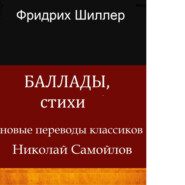По всем вопросам обращайтесь на: info@litportal.ru
(©) 2003-2025.
✖
The Poems of Schiller — Third period
Настройки чтения
Размер шрифта
Высота строк
Поля
For the distant, happy islands
Now the vessel sallies forth,
And the southern fruits, all-golden,
Pours upon the eager north.
As a type, then, — as an image,
Be to us this fiery juice,
Of the wonders that frail mortals
Can with steadfast will produce!
THE COMPLAINT OF CERES. [15 - It may be scarcely necessary to treat, however briefly, of the mythological legend on which this exquisite elegy is founded; yet we venture to do so rather than that the forgetfulness of the reader should militate against his enjoyment of the poem. Proserpine, according to the Homeride (for the story is not without variations), when gathering flowers with the Ocean-Nymphs, is carried off by Aidoneus, or Pluto. Her mother, Ceres, wanders over the earth for her in vain, and refuses to return to heaven till her daughter is restored to her. Finally, Jupiter commissions Hermes to persuade Pluto to render up his bride, who rejoins Ceres at Eleusis. Unfortunately she has swallowed a pomegranate seed in the Shades below, and is thus mysteriously doomed to spend one-third of the year with her husband in Hades, though for the remainder of the year she is permitted to dwell with Ceres and the gods. This is one of the very few mythological fables of Greece which can be safely interpreted into an allegory. Proserpine denotes the seed-corn one-third of the year below the earth; two-thirds (that is, dating from the appearance of the ear) above it. Schiller has treated this story with admirable and artistic beauty; and, by an alteration in its symbolical character has preserved the pathos of the external narrative, and heightened the beauty of the interior meaning — associating the productive principle of the earth with the immortality of the soul. Proserpine here is not the symbol of the buried seed, but the buried seed is the symbol of her — that is, of the dead. The exquisite feeling of this poem consoled Schiller's friend, Sophia La Roche, in her grief for her son's death.]
Does pleasant spring return once more?
Does earth her happy youth regain?
Sweet suns green hills are shining o'er;
Soft brooklets burst their icy chain:
Upon the blue translucent river
Laughs down an all-unclouded day,
The winged west winds gently quiver,
The buds are bursting from the spray;
While birds are blithe on every tree;
The Oread from the mountain-shore
Sighs, "Lo! thy flowers come back to thee —
Thy child, sad mother, comes no more!"
Alas! how long an age it seems
Since all the earth I wandered over,
And vainly, Titan, tasked thy beams
The loved — the lost one — to discover!
Though all may seek — yet none can call
Her tender presence back to me
The sun, with eyes detecting all,
Is blind one vanished form to see.
Hast thou, O Zeus! hast thou away
From these sad arms my daughter torn?
Has Pluto, from the realms of day,
Enamored — to dark rivers borne?
Who to the dismal phantom-strand
The herald of my grief will venture?
The boat forever leaves the land,
But only shadows there may enter. —
Veiled from each holier eye repose
The realms where midnight wraps the dead,
And, while the Stygian river flows,
No living footstep there may tread!
A thousand pathways wind the drear
Descent; — none upward lead to-day; —
No witness to the mother's ear
The daughter's sorrows can betray.
Mothers of happy human clay
Can share at least their children's doom;
And when the loved ones pass away,
Can track — can join them — in the tomb!
The race alone of heavenly birth
Are banished from the darksome portals;
The Fates have mercy on the earth,
And death is only kind to mortals! [16 - What a beautiful vindication of the shortness of human life!]
Oh, plunge me in the night of nights,
From heaven's ambrosial halls exiled!
Oh, let the goddess lose the rights
That shut the mother from the child!
Where sits the dark king's joyless bride,
Where midst the dead her home is made;
Oh that my noiseless steps might glide,
Amidst the shades, myself a shade!
I see her eyes, that search through tears,
In vain the golden light to greet;
That yearn for yonder distant spheres,
That pine the mother's face to meet!
Till some bright moment shall renew
The severed hearts' familiar ties;
And softened pity steal in dew,
From Pluto's slow-relenting eyes!
Ah, vain the wish, the sorrows are!
Calm in the changeless paths above
Rolls on the day-god's golden car —
Fast are the fixed decrees of Jove!
Far from the ever-gloomy plain,
He turns his blissful looks away.
Alas! night never gives again
What once it seizes as its prey!
Till over Lethe's sullen swell,
Aurora's rosy hues shall glow;
And arching through the midmost hell
Shine forth the lovely Iris-bow!
And is there naught of her; no token —
No pledge from that beloved hand?
To tell how love remains unbroken,
How far soever be the land?
Has love no link, no lightest thread,
The mother to the child to bind?
Between the living and the dead,
Can hope no holy compact find?
No! every bond is not yet riven;

















